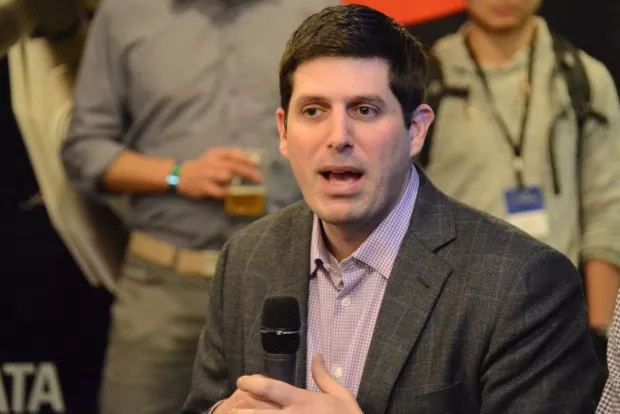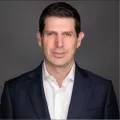Featured in the Fall 2021 Newsletter »
With the launch of the U.S. Digital Corps this summer, the Biden administration signaled a desire to attract early-career technologists and put their skills to work in the federal government. Nick Sinai, Senior Fellow with the Technology and Public Purpose Project (TAPP), co-founded the U.S. Digital Corps.
We asked Sinai to tell us how the Digital Corps came about and his experience working with and making connections between Harvard Kennedy School students and fellows and other young technologists.

“It has been a labor of love over the past year to work on establishing the U.S. Digital Corps. Inspired by my friend, a CTO in a large federal agency who observed that so many problems in government service delivery were related, in his mind, to the fact that 3% of the federal tech workforce is under 30 years old, I workshopped the Digital Corps proposal in the Biden policy committees, with transition officials, with new administration officials, with friends in existing tech units, and with longtime public servants across federal government. I also published the idea publicly via the Day One Project, and built awareness at New America, Brookings, and in the trade press (FedScoop). And most importantly, I recruited two amazing co-founders (Chris Kuang, a former student of mine, co-founder of Coding it Forward and a former TAPP student researcher, and Caitlin Gandhi, a former Teach For America executive) to join government full time to launch this.
The U.S. General Services Administration (GSA)—an agency focused on technology talent as a critical lever for accelerating service delivery—was an early partner to bring the Digital Corps into being and has now established a program office under the leadership of Dave Zvenyach, the head of GSA’s Technology Transformation Service (TTS), and Robin Carnahan, the GSA Administrator.
Other agencies that showed leadership in standing up the Digital Corps include the White House Office of Management and Budget (OMB), with Deputy Director of Management Jason Miller and US Federal CIO Clare Martorana both passionate about increasing tech talent in government, and the Office of Personnel Management (OPM), with Director Kiran Ahuja championing the idea. President Biden’s Domestic Policy Advisor, Ambassador Susan Rice, a former Belfer Center Senior Fellow, and CISA director Jen Easterly have also both been vocal supporters of the Digital Corps.
Digital Corps fellows—with skills in software development, design, product management, data science and analytics, and cybersecurity—will be embedded in agencies throughout government for two-year terms. Initially, in 2022, the Digital Corps will start with approximately 30 fellows in civilian agencies (VA, CMS, GSA, CFPB), but it has the potential to scale to hundreds and hopefully thousands of early-career technologists entering federal service across all of government.
“There hasn’t been—until now—a focused program to get technologists into government at the start of their careers.”
I had the privilege of helping start and scale the Presidential Innovation Fellows (PIF) in the Obama White House under U.S. CTO Todd Park—and the PIF program was subsequently codified by bipartisan legislation. The U.S. Digital Service, the Defense Digital Service (set up by Belfer Center Director Ash Carter and Co-Director Eric Rosenbach), and 18F are mid- and senior-level tech groups in the White House, Department of Defense, and General Services Administration, respectively. But there hasn’t been—until now—a focused program to get technologists into government at the start of their careers.
While people are attracted to government for the mission, the pay gap for technology talent is particularly acute. Our initial idea was to pay low six figures (what top technology talent makes starting their careers), given our desire to recruit a diverse set of people to this program, including those who are the first in their family to access higher education or who are supporting family members. Within the existing constraints of government, we’ve managed to offer $80,000 to candidates who work in the DC area—much higher than the typical $55,000 salary that the federal government offers many college graduates. After two years in the Digital Corps, fellows will be able to convert to GS-12 positions and continue their careers in federal service. We don’t need to match big tech or Wall Street, but we do need to close the gap somewhat to attract enough talented early-career technologists. I’m hopeful that efforts like the Digital Corps can inform the government’s efforts—led by OPM—to invest in and diversify the federal workforce (one of the priorities outlined in President Biden’s recently unveiled management agenda), including with special pay rates for highly-compensated, highly-paid fields. Once Digital Corps fellows get exposed to the people and the mission of government, I’m confident that a good percentage will stick around for years to come.
Harvard, Belfer, and TAPP played a number of important roles in this! My HKS Tech and Innovation in Government field class gave student teams opportunities to work closely with federal agencies; the TAPP non-resident fellowship gave me a platform to explore this concept from the perspective of a world-class research center; Belfer and the Center for Public Leadership gave Chris Kuang research opportunities; and TAPP Fellow Mark Lerner expanded our thinking with his research and case study on federal tech workforce issues. Harvard has also supported Chris’s non-profit, Coding it Forward, in a number of ways—his senior year, he won the President’s Innovation Challenge.
The Biden administration gained the confidence to launch the Digital Corps in part because Chris Kuang and his Coding it Forward co-founders, who hail from Harvard and Wellesley, have successfully proven the model; they have recruited more than 300 diverse student technologists from across the country to intern in federal agencies over the past five years. In many ways, the U.S. Digital Corps is taking the concept of Coding it Forward and building it into a two-year federal program.
While this is just the first step, I’m thrilled to see this come to life.”
"U.S. Digital Corps Expands Government Expertise." Belfer Center Newsletter. Belfer Center for Science and International Affairs, Harvard Kennedy School. (Fall 2021)




